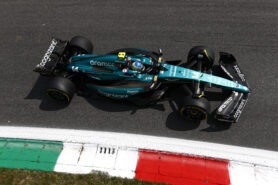Inside FIA's Financial Finesse: How Formula 1's Money Matters Unfolded

In a significant development for the world of Formula 1, the FIA (Fédération Internationale de l'Automobile) has officially concluded its exhaustive review of the Reporting Documentation provided by each of the ten Competitors who participated in the 2022 FIA Formula One World Championship. This comprehensive evaluation focused on the Full Year Reporting Period that concluded on December 31, 2022.
The FIA Cost Cap Administration, responsible for overseeing compliance with the financial aspects of the sport, has taken a rigorous approach in this process. It commenced with an in-depth scrutiny of the documents submitted by the participating teams. Furthermore, the administration conducted extensive examinations of non-F1 activities carried out by these teams. This included multiple on-site visits to team facilities and meticulous auditing procedures to gauge adherence to the Financial Regulations.
It is noteworthy that all Competitors cooperated diligently and acted in the spirit of good faith throughout this intensive review process.
The FIA emphasizes the critical role played by the Financial Regulations in ensuring the long-term financial sustainability of Formula 1. These regulations will continue to evolve and improve based on insights garnered from each review. This encompasses enhancements to both the regulations themselves, which are formulated and approved through the FIA Formula 1 governance process, and the mechanisms employed for their enforcement and oversight. The FIA remains committed to substantial investments in this area for the collective betterment of the sport.
A brief historical note underscores the significance of the Financial Regulations. They were introduced into the FIA Formula One World Championship starting from the 2021 season, having received unanimous approval from all Competitors. The primary intent behind these regulations is to curtail extravagant spending within the Championship, thereby safeguarding its long-term viability and fostering performance convergence among Competitors, ultimately leading to more thrilling races.
Given the intricate nature of Formula 1 as a sport, the process of auditing submissions from Competitors by the FIA Cost Cap Administration demands a considerable amount of effort. However, thanks to additional resource commitments made by the FIA, this process has been expedited, resembling timelines seen in other major sporting competitions.
The responsibilities of the Cost Cap Administration encompass administering and monitoring compliance with the Financial Regulations, investigating suspected instances of non-compliance through audits or launching comprehensive investigations when warranted, and enforcing appropriate actions for alleged breaches.
In cases of alleged breaches, the Cost Cap Administration has various avenues of action. These include entering into a settlement known as an Accepted Breach Agreement (ABA) when suitable, particularly for Procedural Breaches or Minor Overspend Breaches. Alternatively, if no consensus can be reached or if the situation deems it necessary, the administration may refer the case to the Cost Cap Adjudication Panel. In instances of alleged Major Overspend Breaches, the case must be referred to the Cost Cap Adjudication Panel.
The Cost Cap Adjudication Panel comprises a panel of judges, ranging from six to twelve members, elected by the FIA General Assembly in accordance with the FIA Statutes. These judges are selected from candidates proposed by either the FIA Sport Member Associations with voting rights or a group comprising a minimum of five F1 teams.
Consequences for Procedural Breaches may involve Financial Penalties and/or Minor Sporting Penalties, with specifics outlined in the Financial Regulations. In cases of Minor Overspend Breaches (less than 5% over the Cost Cap), penalties can again include Financial Penalties and/or Minor Sporting Penalties. However, it's important to note that only a Material Overspend Breach (greater than 5% over the Cost Cap), if confirmed before the Cost Cap Adjudication Panel, will result in mandatory Constructors’ Championship points deductions, and may entail additional Financial Penalties and/or Material Sporting Penalties.
For those interested in delving deeper into the intricacies of the Financial Regulations, the full document is available for reference here
This meticulous process underscores the FIA's commitment to maintaining financial fairness and competitiveness in Formula 1, ensuring the sport's continued growth and excitement for fans around the world.
✅ Check out more posts with related topics:












